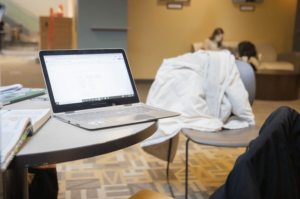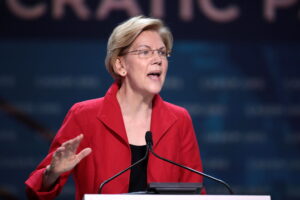Tag: Alyssa Cohen ’21
Protecting Communal Welfare in the Age of Coronavirus
by The Cowl Editor on October 1, 2020
Campus

Protecting Communal Welfare in the Age of Coronavirus
by Alyssa Cohen ’21
Opinion Staff
The COVID-19 pandemic has upended individual lives across the nation and world. It can be comforting to call this a collective hardship shared by many; however, it may be more productive to consider each struggle as a unique one, broadening the scope by which we analyze the diverse impacts of this health crisis.
One effect of the pandemic is the way in which the virus disproportionately impacts low-income communities. A Time Magazine analysis conducted back in April found that “low-income communities, particularly those with a high minority population,” have suffered disproportionately from the outbreak. Providence College is located in a community whose surrounding residents are largely Black and Latinx. An outbreak of COVID-19 for students likely means an outbreak in the surrounding communities that we frequent for resources that are inaccessible on campus.
More specifically, new findings from the New York University Grossman School of Medicine examined “the interplay between race and ethnicity and income on COVID-19 cases and related deaths in 10 major U.S. cities.”
The study determined that within the “more-poverty counties” of these cities, “those with substantially non-white populations had an infection rate nearly eight times that of counties with substantially white populations” and died from COVID-19 at “nine times the rate as those living in predominantly white counties.” Dr. Ogedegbe, professor of medicine and population health, at NYU Langone, hypothesizes these disparities to be byproducts of “structural racism.”
However, the effect of COVID-19 on low-income areas does not end at increased rates of infection. Those of lower socioeconomic status have been financially devastated by the COVID-19 outbreak, not to mention those who experienced conditions of poverty prior to the pandemic.
According to a survey conducted by the Urban Institute from March 25 to April 10, about one-third of all adults in the United States “reported that their families could not pay the rent, mortgage, or utility bills, were food insecure, or went without medical care because of the cost during the last 30 days,” and “two-thirds, or about 68.6%, of these adults had family incomes below the federal poverty level.”
This study also found Black and Latinx communities to be disproportionately affected by economic hardship, with “over 45% of [B]lack and Hispanic adults” reporting that their families experienced one or more of the aforementioned hardships within the respective 30-day period.
Such insight is particularly important to consider as PC students, given our on-campus and off-campus residents share a community with some of the lowest-income neighborhoods in the state of Rhode Island.
Take, for example, the neighboring community of Wanskuck, which is made up of 70.9% Black, Indigenous, People of Color. This is also a population in which 49.1% of residents rely on food stamps, and the median annual household income is $36,000.
Being so close to an impoverished, majority BIPOC community, PC students have the ability to worsen the state of the pandemic in a community that already lacks resources if they are not mindful of their actions. Accordingly, neglecting to acknowledge concerns voiced by members of the surrounding community only exemplifies the privilege we have being at a predominately white institution.
Therefore, it is our obligation, for the sake of the common good, and in order to be actively anti-racist, to protect the health and well-being of ourselves, our social circles, and our greater community. This entails taking the appropriate measures to reduce the spread of COVID-19 amongst both on and, especially, off-campus students, as well as an activism that exceeds merely curtailing the physical threat of the virus.
It is our shared responsibility to secure the welfare of people by listening to the specific requests of the communities most significantly impacted by the pandemic, as well as the negative effects of any social or economic structure of our American society at large.
Ultimately, in light of the November elections quickly approaching, our best means of advocating for the common good may be electing leaders on a local, state, and federal level who represent, reflect, and understand the needs of the most vulnerable members of the American public.
PC must unite as a campus, not only to get out and vote, but also to actively practice anti-racist behaviors via attention to quarantine protocols and regard for our neighbors. It is the only way we may maintain any sort of protection for the common good.
Vote for the People’s Economy this November
by Andrea Traietti on September 3, 2020
Opinion
by Alyssa Cohen ’21
Opinion Staff

Amidst a global pandemic, soaring unemployment and growing wealth inequalities persist in the United States. Based upon the numbers alone, the American economy is booming. Trump has boasted the rebound of our nation’s stock market, and in this instance, he technically is not lying.
The Nasdaq and the Dow Jones Industrial Averages have recovered from the depths of the first half of 2020, and superficially, the economy is “healthy” again, according to the BBC. However, the age of COVID-19 has illuminated the paradox citizens are impelled to inquire: Why does the market report national prosperity in a time of widespread economic hardship?
Perhaps we may discern that neither the Dow nor the Nasdaq are effective indicators of the economic welfare of the American people, as much as the indices are reflective of wealth fluctuations of large corporations and their shareholders.
During the COVID-19 pandemic, corporations that produce services and technology conducive to the culture of “the new normal” have expanded tremendously. According to the New York Times, this especially pertains to American tech giants including Amazon, Apple, and Facebook—companies that nearly monopolized their industries even prior to the pandemic.
This, of course, elicits tremendous profit and power for a corporation’s already absurdly wealthy high executives and largest investors. The expansion of big tech is also widening the income gap and harming the livelihoods of corporate workers, small businesses, and, frankly, the American public in general.
According to New York Times writer Shira Ovide, the “stock market shares are owned disproportionately by the richest people in society,” thus the rise of big tech amidst the COVID-19 pandemic “comes at a moment when politicians and the public are wondering if America’s digital superstars are so powerful—and perhaps, tilt the game to their advantage—that they simply cannot be beaten.”
Ovide’s concern proves legitimate, considering that within American capitalism, excessive wealth produces more than merely material opulence—it enables the few individuals in possession of the majority of the nation’s capital to exercise unfettered social, political, and cultural dominance. In turn, the tremendous wealth accumulation of the highest executives and largest shareholders of big tech presents as especially worrisome considering that many reigning American corporations have actively inhibited their employees from defending themselves from exploitation, discrimination, and other violations of their human rights via unionization.
To use the glaring example of Amazon, according to New York Times writer Christy Hoffman, a former vice president at Amazon named Tim Bray resigned from the company back in May after witnessing the firing of activist workers within the company who began protesting unsafe working conditions and expectations during the pandemic.
Consequently, Bray blames the inability of Amazon’s workers to unionize as a factor perpetuating their exploitation as he writes, “Amazon’s decision to fire the activists was easy to make in the United States, where Amazon workers have no union and are left to fend for themselves.”
Despite their reputation as being one of the most profoundly exploited communities of American workers, the capacity to be violated by big tech, or any other reigning corporation, is not limited to those employed by Amazon. Without the protection of a union, especially in light of the unbridled economic expansion of corporate America exacerbated by the COVID-19 pandemic, the rights and liberties of every employee, or future employee, in the United States could be in jeopardy.
Even within our very own Providence College community, employers of the institution are more susceptible to unjust treatment in the workplace because of their inability to unionize. This includes, though is not limited to, the College’s administrators and professors, the UG2 employees who work to clean campus facilities, as well as the Sodexo staff.
With college students being a weighty voting demographic, PC students should vote to elect candidates who will write, promote, and implement legislation that will incite economic reform that will benefit the whole of the American people. We should resist the temptation to preserve the status quo and “vote for the economy” based upon the allurement of a “thriving” Nasdaq or Dow Jones that feign the presence of economic stability amongst the American people, while, in actuality, most predominantly reporting the rates at which America’s most wealthy are becoming wealthier.
However, even after voting for new progressive political leadership and legislation that will break up big tech, protect workers’ rights, and promote unionization, we must not stop there. It is high time to unite as college students, employees, and residents of the United States to reevaluate our fundamentally failing economic system—a structure that reports the prosperity of a country in a time in which the vast majority of its population is vulnerable to exploitation, and is ailing economically.
Tangents & Tirades
by Andrea Traietti on March 5, 2020
Opinion
Addressing Period Poverty
Recently, Scotland’s Parliament passed the first stage of the Period Products (Free Provision) (Scotland) Bill. First proposed in 2017 by Scottish Parliament member Monica Lennon, the bill would require the government to ensure that free period products, such as tampons and pads, are available for any woman who needs them. The Scottish government estimates executing such a bill would require about £24 million annually to help women who have a hard time affording period products.
“Period poverty” is a term used, in part, to describe women who do not have the financial means to afford menstrual products. According to a study published by the International Federation of Gynecology and Obstetrics, over 500 million people across the globe cope with period poverty. In addressing this issue head on, Scotland’s Parliament had a two-hour candid debate about women’s health and the stigmatization of menstruation.
The stigma surrounding periods makes the topic one that is frequently abandoned between men and women. With society constructing this natural process as embarrassing or “unclean,” women are selective about who they discuss their menstrual cycles with and can often be found hiding their menstrual products up their sleeves or inside boots to avoid humiliation.
The need for more open conversation and education about menstruation could potentially lead to more legislation that may help the millions of women around the world who live in period poverty. Although multiple states in the U.S. (excluding Rhode Island), have outlawed taxes on menstrual products, Scotland’s first step towards free period products is a hopeful step for the future here.
—Kerry Torpey ’20
Voting Absentee for Primaries
With the 2020 primary season in full swing, now is the time to apply for your absentee ballot as soon as possible.
In order to begin improving the health of our democracy, voter turnout proves imperative. To that end, participation in your state primary need not be sacrificed merely because you may be out of state during the time of the election.
An application for an absentee ballot can be completed within a matter of minutes at Vote.org—you will simply input your home address and a ballot can be mailed to you here at Providence College or to the location of your preference.
Although Super Tuesday has come to pass, the majority of states have still yet to vote in this highly contested race, with the Rhode Island, New York, Connecticut, and Pennsylvania primaries right around the corner on April 28.
In the meantime, it remains critical to the welfare of our nation that as many college students as possible research the politics of the remaining candidates in the race to fully participate as informed voters in the electoral process.
In turn, within our present electoral structure, casting a ballot in the primary election as an educated voter proves our best means of influencing whether the candidate that promises the brightest future for both the American and global public may be elected as president so that she or he may enact the change we hope to see in the world.
—Alyssa Cohen ’21

Eat Less Meat for the Environment
Students on Providence College’s campus are quite familiar with the idea of skipping meat once a week, since during the Lenten season PC offers no meat options in its dining halls on Fridays. However, there might be another lesser-known and non-religious reason why we should all consider skipping meat for a day: to decrease our impact on the environment.
According to the New York Times, 14.5 percent of the world’s greenhouse gas emissions per year come from the meat and dairy industry—roughly the same amount emitted by the various transportation industries.
This is a massive amount of emissions. However, it actually would not require massive lifestyle changes in order to improve this number. Making a difference does not actually require going vegan or vegetarian, or cutting out meat and animal products entirely. Simply eating less meat and dairy can significantly improve the toll that our eating habits are taking on the environment.
Small and simple diet adjustments can make all the difference, while still leaving room for the occasional cheeseburger. New York Times food writer Melissa Clark suggests an 80-20 strategy: following a diet composed 80 percent of plant-based foods, and 20 percent of meat and dairy.
Achieving this ratio could involve any number of changes, but a good place to start is with protein replacement: including more beans, chickpeas, and high-protein nuts (such as almonds) in your diet. New plant-based meats, like those offered by Beyond Meat—which is now featured at Dunkin’—are another great option if you find tofu unappealing.
Overall, while eating a more plant-based diet might boost your own physical health, it can definitely also help to improve the planet’s health in the process.
—Andrea Traietti ’21
Writer vs. Writer: Is It Safe to Leave Your Possession out in the Open on Campus?
by Andrea Traietti on February 13, 2020
Opinion

this family always trustworthy when it comes to valuables left out on campus? Laura Chadbourne ’20/The Cowl.
NO
by Marie Sweeney ’20
Opinion Staff
A common practice among students at Providence College is to leave their valuables around campus due to the strong amount of trust students have in one another.
However, students need to be more careful with where they place their items because there is a risk of non-student and student thieves, students mistaking others’ items for their own, and the fact that not everyone can be trusted.
The Concannon Fitness Center is a common place where people put their items at risk. Students have developed the practice of leaving valuables such as wallets, headphones, phones, and more in the cubbies, which are in plain sight.
This also occurs in the library, where students will leave their laptops on tables for hours unattended. Anyone, a student or a non-student, could take it.
Although some may argue that this is just a part of the PC culture and that we should embrace it, there are individuals that can take advantage of the unspoken trust that students have for one another. For instance, there have been many reports in certain residence halls of people stealing clothes from the laundry rooms.
Rachael Kelly ’20, a student worker at Concannon, said, “People report missing items to us all the time. Someone loses their airpods or airpod cases at least once a day.”
While this trust among students is part of the Friar culture, it is not worth it for students to put their valuables at risk. Students need to be more careful where they place their important items to avoid the risk of them being taken.
Unfortunately, not everyone can be trusted and when it comes to the more expensive and important items, it is always better to be safe than sorry.
YES
by Alyssa Cohen ’21
Opinion Staff
While it is a gamble to leave one’s valuables unattended on campus, or within any public setting for that matter, Providence College students have no reason to fear their belongings being stolen.
Considering the many anxieties that may be induced by the academic rigor and social culture of the college lifestyle, the concern of being robbed on campus need not present itself as an added stressor.
The trustworthiness of the PC community is evident in a variety of ways. Take, for example, the “lost and found” page that has naturally emerged on the PC mobile app that students constantly utilize to connect with one another to return missing belongings.
Additionally, the culture of the Concannon Fitness Center also proves the trustworthiness of the College campus.
Despite the fact that students regularly leave electronics, wallets, airpods, and other valuables unattended in the cubbies on a daily basis, Hannah Lavery ’22, a student worker at the fitness center, says, “Claims of articles being stolen are pretty rarely reported.”
Not to mention the fact that language and behaviors of skepticism and paranoia towards having one’s belongings stolen emit an air of distrust of one’s peers.
Such attitudes are detrimental to efforts to promote an inclusive and welcoming atmosphere within the PC community.
Essentially, while it is always important to use common sense when it comes to leaving valuables unattended in any public setting both on or off campus, manifesting constant anxieties of robbery is both unproductive and unnecessary, and emits toxic energy into our campus community.
Capitalism has Devalued the Undergraduate Degree
by Andrea Traietti on February 6, 2020
Opinion
by Alyssa Cohen ’21
Opinion Staff
Have you ever heard students at Providence College refer to their degree as simply a means by which they expect to make money? Are you one of those students? This idea is a common misunderstanding of what college education should mean to the American people, and can be linked to the capitalist state of the U.S.
In a recent Humanities Forum, Duff McDonald discussed his latest publication entitled The Golden Passport: Harvard Business School, the Limits of Capitalism, and the Moral Failure of the MBA Elite. In his discussion, McDonald revealed the disturbing truth that our society relates failure to a lack of financial success as opposed to a lack of moral prosperity.
Essentially, our capitalist society links success first and foremost to a high salary, and failure to low  earnings; however, McDonald’s presentation pointed out that real failure has nothing to do with money, but rather with morality.
earnings; however, McDonald’s presentation pointed out that real failure has nothing to do with money, but rather with morality.
The nature of American capitalism is to blame for this situation, as it has diminished the value of education by conflating wealth with overall success. The spirit of capitalism is deeply embedded in our American culture, priming us from childhood to believe that hard work yields financial prosperity, which fosters both a comfortable (perhaps even luxurious) lifestyle, as well as the respect of our peers.
In turn, the value of higher education has become a casualty of the association of large salaries with status and achievement. Many college students perceive their undergraduate education merely as a means to an end, likely a high paying job, rather than an end in and of itself.
According to CNBC, as American society now refers to the undergraduate degree as the “new high school diploma,” the predominant perception of the purpose of higher education has degenerated from an opportunity for further enlightenment, investigation, and personal discovery to merely another credential necessary in achieving a lucrative occupation.
A study conducted at San Diego State University showed that 71 percent of millenials ranked “to be able to make more money” as the most significant reason they enrolled in college, above “to learn about something that interests me” or “to prepare myself for graduate or professional school.”
The results of this study endure amongst undergraduate students, as reflected in the profit-seeking motivations that inspired many Providence College students to enroll in college and pursue a degree in their chosen fields.
Quess-Symphonee Johnson ’21 said, “I work with incoming freshmen through two different pre-orientation programs and I have spoken with a number of students who admitted one of two things: they aren’t interested in their declared major, or they already have jobs lined up for them within their parents’ business so they are only enrolled in college for the piece of paper that is their degree.”
 In a culture that so closely equates money-making with success, it is no wonder higher education can be perceived as onerous, especially given that most careers that pay a living wage, let alone high-paying professions, call for at least an undergraduate degree. Not to mention that the unfortunate reality of skyrocketing tuition rates has only contributed to this devaluement of higher education.
In a culture that so closely equates money-making with success, it is no wonder higher education can be perceived as onerous, especially given that most careers that pay a living wage, let alone high-paying professions, call for at least an undergraduate degree. Not to mention that the unfortunate reality of skyrocketing tuition rates has only contributed to this devaluement of higher education.
According to CNBC, the average cost of one year at a public university for an in-state student is $20,090, and $34,220 for out-of-staters. The cost of private school, including tuition and fees, can be almost twice as high.
In contemporary American society, students entering the workforce must handle the increasing economic burden of college debt before they can begin to amass personal financial gains.
Consequently, the pressure of paying off student loans may deter students from pursuing an undergraduate major they are passionate about if the degree seems unlikely to result in a high-paying job.
Essentially, steep tuition rates, along with the association of immense wealth and overall human flourishing, have undermined the importance of education in its own right and, in many cases, sapped the joy of learning from the undergraduate experience altogether.
Americans have been inculcated with the illusory notion that even if you hate what you do for work every day, if your job pays a high salary, you will be both happy and respected in the world.
This sentiment is false for a myriad of reasons, one of which is evident in the declining mental health of college students—the very population pursuing degrees for the sake of “making more money.”
The American Psychological Association recorded that 41.6 percent of college students reported experiencing chronic anxiety, while 36.4 percent of students reported regular feelings of depression.
Logically, one could venture that these concerning statistics could be at least marginally reduced if more students found meaning and fulfillment in their education—a purpose greater than money.
Despite the innumerable ways in which the present American economic structure has devalued higher education, this issue is not irreparable.
We must strive to correct our misplaced values as a society. We must strive to combat attitudes of money-worship and revive a reverence for education to inspire and rejuvenate the love of learning in our American society.
If we can unify to invest in knowledge and education, we will reap the benefits of this investment—a better understanding of ourselves, each other, and the world around us, and in turn, a happier, more fulfilling life—something money simply cannot buy.
Photos courtesy of freepngimg.com and needpix.com
Military Spending and the 2020 Election: What You Need to Know
by Andrea Traietti on January 16, 2020
Opinion

by Alyssa Cohen ’21
Opinion Staff
The recent concern of war with Iran amidst the height of the 2020 presidential campaign has brought the topic of military spending in the political limelight.
The question remains whether the enormous sums of money the United States government channels into the Pentagon are legitimate.
According to defensenews.com, the Senate recently approved President Trump’s request to increase the defense budget, now allotting $738 billion dollars for military spending in the year 2020.
Several progressive candidates in the 2020 race have proposed campaign platforms that would involve implementing more stringent laws surrounding military spending as well as significant cuts to the Pentagon’s ever-expanding budget.
Despite the superficial logic of implementing such reforms in military spending, the looming prospect of a war with Iran may encourage voters to veer away from casting their ballots for candidates who propose such progressive platforms.
As military spending and military power oftentimes become conflated, voters could mistakenly snub a candidate who supports reforming rather than increasing the Pentagon’s budget as they may perceive such policy as a threat to U.S. safety, especially in light of current tensions between Iran and the United States.
In actuality, reforming the way the United States currently invests in the Pentagon would allow federal funds to be better maximized, given that such change would inhibit the enduring influence of corporate corruption upon the Pentagon by closing the revolving door between employees of the Department of Defense and corporate contractors.
According to POGO.org, in 2016 the “top 20 defense contractors had hired at least 645 senior government officials, military officers, Members of Congress, and senior legislative staff” and “nearly 90 percent of those former federal employees now work as lobbyists, while the operational skill is influence peddling.”
Not to mention the United States Secretary of Defense from 2017 to 2019, Patrick M. Shanahan, was a former top executive for Boeing.
According to elizabethwarren.com, contractors of large corporations such as Boeing and Raytheon have “deployed an extremely profitable strategy” in hiring retired government officials affiliated with the Department of Defense as lobbyists.
Essentially, corporate executives utilize former government employees “to use their relationships and access to influence our country’s national security apparatus for one purpose— to secure lucrative contracts and boost profits.”
Consequently, the extent of this corrupt corporate influence upon the Pentagon may be directly reflected in the findings of a recent audit of the establishment. According to nation.com the Pentagon failed its 2018 audit report revealing over 21 trillion dollars of funds unaccounted for between the years of 1998 and 2015.
The past mismanagement of federal spending at the Pentagon proves especially disheartening considering that, corruption aside, the United States boasts the largest global military budget—greater than that of the ten military powers behind us combined.
According to POGO.org, the U.S. spends more on the Pentagon budget than on “education, medical research, border security, housing, the FBI, disaster relief, the State Department, foreign aid—everything else in the discretionary budget put together.”
While it remains critical to the safety of the nation to maintain and invest in the military, the excessive funds the U.S. continually funnels into the Pentagon fail to improve the overall safety of the country. Corporate corruption within the government has enabled the mismanagement of taxpayer dollars that should rather be invested in education and healthcare rather than channeled into the pockets of corporate executives.
According to buisnessinsider.com, while America proves one of the wealthiest nations in the history of the world, equipped with one of the strongest military powers, our nation has fallen to number 27 in the world in terms of healthcare and education. Concurrently, approximately 13.9 percent of our population falls below the poverty line as healthcare expenses perpetually serve as the leading cause of bankruptcy in the nation.
To that end, in order to better implement federal funds, progressive candidates in the 2020 presidential race have offered policy proposal campaigns to reform military spending.
Such policies include the implementation of legislature that would terminate the influence of the revolving door between corporate contractors and the Pentagon, and the redistribution of military funding to ensure taxpayer dollars are most effectively utilized. Essentially, despite the timeliness of the threat of war with Iran in conversation with the upcoming Democratic primaries and 2020 presidential election, Providence College students should consider voting for candidates who prioritize the reform, regulation, and redistribution of military funding.
As college students constitute a large number of voters in the United States, we can have a substantial impact on the outcome of the presidential election. Consequently, the influence of college voters could incite instrumental reform in terms of improving the budgeting and oversight of federal capitol.
In turn, PC students have the power to elect progressive candidates that could improve the safety and overall welfare of the public and enable the military budget to be maximized and reallocated to establish a more equitable American society.
(Re)Branding the Tradition of Gift-Giving: Combatting the Corruption of Materialism This Holiday Season
by The Cowl Editor on December 5, 2019
Opinion

by Alyssa Cohen ’21
Opinion Staff
Each December, the stress of holiday shopping has become a commonplace complaint amongst Americans—particularly to college students who often lack the extraneous funds and the time necessary to establish holiday shopping as a priority.
According to a Healthline survey, upwards of 60 percent of Americans experience elevated stress levels during the holidays. Those who completed the survey identified the financial and social pressure of holiday shopping as the most significant catalyst for their increased internal tension.
The tradition of the gift exchange is perpetuated each year with the intention of engendering a fun opportunity for families and friends to reunite and demonstrate their appreciation for one another. However, this tradition has degenerated into another chore within the hectic American schedule.
Consequently, corporate America capitalizes on the innumerable thoughtless purchases of Christmas gifts from Amazon or local malls. People feel obligated to buy costly gifts for as many people on their list as possible within a restricted time span.
These purchases, though well-intentioned, enable the chore of holiday shopping to become entirely materialized, diminishing the inherent virtue and value of the tradition of gift-giving.
The commercializaton of the holiday season has incited a skewed social perception of name-brands and municipal value as the most critical qualification to consider when identifying an appropriate holiday gift. This societal conflation of the cost and quality of a gift has irrefutably influenced the financial stress surrounding the holiday shopping process and devaluation of the gift-giving tradition altogether.
In order to combat the commercialization of of the holiday season, society must redefine its qualifications for an appropriate holiday gift as something demonstrative of the interests, values, or needs of the recipient rather than merely as something that costs a lot of money.
Regardless of the price of a gift, if the present is impersonal to the recipient, it will likely seem useless or meaningless to them and by default, the purchase of the gift proves a waste of money and time for the giver.
That being said, finding a “thoughtful” or “personalized” gift does not necessarily mean embarking on a quest for the most creative and meaningful item that the recipient never even realized they always wanted. One could instead get crafty or think practically.
In many cases, a letter to someone on your gift list explaining your appreciation or adoration for them or a framed photograph of loved ones may prove exceedingly more meaningful than any store-bought item. Also, if a holiday shopper is deciding what to purchase for a gift they should consider what items the recipient will actually use through the consideration of their likes and interests, the stores and restaurants at which they regularly shop or eat, as well as their potential work, school, or domestic needs.
Gift-giving should also transcend materialism in the sense that presents do not have to be tangible. A plan to catch up over lunch or to attend a day trip, concert, play or sporting event with someone can also serve as a meaningful present. After all, the holiday season should be about reuniting with family and friends, appreciating the presence of loved ones within your life, and making memories.
In turn, society must not enable name brands and pricey electronics to hijack the inherent virtue and purpose of the holiday season. Instead, we should refocus our energies on enjoying the present moment and taking a hiatus from the otherwise relentless chaos of the year—especially as college students. This holiday season, we should be sure to appreciate the people in our lives who make each day a bit more manageable and inspire us to persevere through the mayhem of the quotidian.
Tangents & Tirades
by The Cowl Editor on November 21, 2019
Tangents
Be Present During the Dash to Class
Walking to classes at Providence College is comprised of a set of unspoken rules. AirPods in, hoods up, and heads down. But if you take a moment to pause the music and listen to your surroundings, you’ll notice that it’s surprisingly quiet.
The lack of social interaction when we walk to class is somewhat concerning. It seems too quiet to say hello to your friends passing by, but also rude if you walk by in silence.
Some promote the idea of listening to music in between classes as a way to destress and focus on something else for the five to ten minutes that you have alone to yourself during school hours. Others use it as a means of avoiding social interaction if they are walking alone or don’t wish to look up from their phones.
We may all be a little guilty of taking the easy way out and putting earbuds in, but maybe try and be aware of your surroundings and all your peers passing by next time you walk to class.
If completed, one would notice all the little things that make campus so special. It could be the way sunlight shines through the leaves of the tress, or maybe, if you’re lucky, you’ll see the occasional dog and dog walker.
While it’s totally understandable to want time to destress while walking to class, use social interaction as a way to try and achieve that, rather than avoiding it all together.
—Katie Belbusti ’22

Choosing a Major: Quality Over Quantity
College has become overwhelmingly “degree-centric.” All too often undergraduate students perceive course selection as merely checking boxes off a list of major and minor requirements in order to achieve the maximum number of degrees.
Irrefutably, the fostering of competencies across numerous disciplines proves intellectually and empathetically enriching whenever a student can harness a genuine interest in their major or minor course material. However, as our contemporary society has grown increasingly achievement-oriented, students experience a sense of social obligation, rather than an intrinsic motivation to acquire excessive academic degrees. Overall, this phenomenon has devalued the educational opportunity of earning an undergraduate degree.
Given the rigor of the core curriculum, many Providence College students in particular who pursue additional degrees with their major, begin to perceive each semester’s course load as merely another set of obstacles standing between themselves and their undergraduate diploma.
To that end, it proves critical that we revive educational morale within the PC community by encouraging each other, both institutionally and on an individual basis as students, to exclusively attain majors and minors of both importance and interest to us.
Such curricular selectivity will provide us with the versatility within our schedule to pursue academic curiosities through electives courses and invest the preponderance of our energies in developing a passion for our majors—thus reinforcing the invaluable enrichment opportunity that is the undergraduate experience.
—Alyssa Cohen ’21

The Canonical Crossroads of Catholicism and Capitalism: Why American Catholics Should Consider Democratic Socialism
by The Cowl Editor on November 7, 2019
Opinion

by Alyssa Cohen ’21
Opinion Staff
For too long the Catholic identity has been mistakenly aligned with conservatism and voting conservative is seen as the only option for American Catholics who want to see their views represented politically.
According to the Pew Research Center, some 37 percent of Catholics identify as Republican, establishing conservatism as the most popular political affiliation of the faith. This statistic proves surprising considering that, while the political right embodies some Catholic values, such as the pro-life stance, the conservative political agenda also turns sharply against other Catholic teachings.
Specifically, conservative economic policy has allowed for the excessive accumulation of wealth in the top percentile of American society while masses of people enduringly struggle to make ends meet living under the poverty line—a clear inversion of Catholic values.
To that end, why do so many individuals automatically associate the conservative party with Christian beliefs? American Catholics should recognize that voting right is not the only option: liberal ideologies like the democratic socialist platform might actually have something to offer to American Catholics who yearn for their values to be represented politically—especially regarding the issue of wealth inequality.
According to The Washington Post, the top one percent of the population now yields some 40 percent of the country’s wealth while 13.5 percent of the population (43.1 million Americans) live below the poverty line as the middle class continues to shrink. Conservative economic policy promotes the expansion of this income gap by implementing tax cuts for the wealthy, amongst other financial loopholes, which enable the top one percent to continually amass excessive wealth and power.
While such policies permit an unbridled accumulation of wealth for an individual or corporation, the Bible identifies money to be “the root of all evil” (Timothy 6:10) and advises against “storing up treasure for themselves on earth, where moth and decay destroy, and thieves break up and steal” (Matthew 6:19) while encouraging humans to “speak up and judge fairly; defend the rights of the poor and needy” (Proverbs 31:8-9).
To that end, such Christian teachings are directly contradicted by innumerable aspects of the conservative political agenda, which enables corporations and big business to usurp control over the fate of many American workers in pursuit of wealth and power.
Dorothy Day, a founder of the Catholic Worker Movement who is currently being considered for canonization, grappled with the issue of inequitable wealth distribution throughout her life. “The Aims and Means of the Catholic Worker,” the document that outlined the central goals of the Catholic Worker movement, says, “Private and state capitalism bring about an unjust distribution of wealth, for the profit motive guides decisions.”
It also asserts that “those in power live off the sweat of others’ brows, while those without power are robbed of a just return for their work.”
This Catholic critique of capitalism encapsulates the influence of the corrupt practices of large corporations, such as Amazon, within our present American culture. Higher-ups in such organizations amass surpluses of our country’s wealth while the work of their employees becomes devalued—they work long, taxing hours yet enduringly struggle to afford healthcare, higher education, and in some cases, even housing and food for their families.
Thus, the conservative economic agenda would prolong the devaluation of the work of the middle class and the expansion of the American population living below the poverty line—societal circumstances that Catholic teachings would intend to combat.
To that end, the automatic social conflation of Catholicism and conservatism proves enigmatic—why do we automatically conflate conservative politics with Catholicism when the conservative political identity yields such a vast number of ideologies incongruent with the teachings of Christianity?
A potential rationale for the mistaken conflation of these respective religious and political identities may be attributed to one of the few common values between the two affiliations—a unifying pro-life stance. On the single-issue basis of abortion, the conservative ideology may represent a pro-life opinion more aligned with the Catholic church; however, considering the present influence of our nation’s wealth inequality upon those in poverty, the democratic socialist platform may represent the Catholic stance on wealth more wholly.
Considering the economic concerns of the Catholic Church, then, it would prove unfair to associate only one party with Catholic or Christian teachings. The conservative party is not the only option for Catholics, as is commonly assumed in the present state of politics. Catholic voters do not have to be single-issue voters, and if that is the case, American Catholics should start considering the policies of the democratic socialist ideology.
However, the Republican Party is not the sole party representative of pro-life Catholic values. If a prerogative of the Catholic church is to reduce the number of women seeking abortions, advocating for conservative political policies that strive to condemn abortion by defunding women’s health organizations or by delegalizing abortion altogether would merely superficially condemn the practice rather than remedy the underlying causes of women seeking abortions.
According to a study conducted by the Guttmacher organization on abortion rates in the United States, “Some 75% of abortion patients in 2014 were poor (having an income below the federal poverty level of $15,730 for a family of two in 2014) or low-income (having an income of 100–199% of the federal poverty level).”
Essentially, the results of this study imply a strong correlation between an unstable financial standing and a woman’s decision not to carry to term. Thus, a more effective means of reducing the number of abortions performed within the United States would prove to first remedy the systematic economic injustices that compel women to seek abortions in the first place.
To that end, democratic socialist policy rather than conservative policy strives to redress financial inequality and corporate exploitation by redistributing the municipal of the ultra wealthy in order to aid the middle class and those in poverty.
Such redistribution of wealth, along with other political policies aligned with the ideology of democratic socialism promote accessible, quality healthcare and educational opportunities, along with a more equitable treatment of all Americans regardless of gender, socioeconomic, racial, or religious identity—all resources and virtues combative of the crime and violence that becomes symptomatic of conditions of oppression and poverty.
Essentially, as long as establishing more moral communities endures as a prerogative of Catholicism, the conservative party, whose economic policies perpetuate some immoral behaviors of the ultra wealthy along with the inequitable treatment of human beings, cannot be considered the sole option for American Catholics, despite the party’s incorporation of a pro-life stance.
To that end, democratic socialist policy that incorporates wealth redistribution to promote human flourishing regardless of socioeconomic status could enable morality to replace money at the forefront of the American cultural agenda, thus establishing a society more aligned with the values of Catholicism. American Catholics should keep this in mind the next time they go to vote.
“I Care About You So Much, I Don’t Want You to Become a Teacher”: PC Must Evaluate Fairness of Practices in Department of ESE
by The Cowl Editor on October 3, 2019
Opinion

by Alyssa Cohen ’21
Opinion Staff
Dr. Anthony Rodriguez has been fighting for racial justice within the elementary and special education major since his students and advisees began reporting professors within the department for conducting discriminatory practices in 2012. In subsequent years, Providence College’s efforts to reform have done little to abolish the continuation of such injustices. To that end, it is time that as a campus community we condemn these discriminatory practices and demand immediate rectification.
In anticipation of the press release that the PC Coalition Against Racism issued on Sept. 18 highlighting discrimination in the department, the College sent a statement to the PC community. In this statement, the College referenced attempts it has made to address these issues, which included removing the essay requirement for entrance into the ESE program and advocating for the RI Department of Education to reform their admission requirements for educator preparation programs in the state. The College also cited ongoing efforts by Fr. Brian J. Shanley, O.P., in conjunction with the state, and referenced goals for the ESE program outlined in the PC200 Strtegic Plan.
However, these efforts have yet to bring about adequate change in the program. According to the press release by the PC Coalition Against Racism, students of color are facing discrimination through multiple facets of the elementary and special education major.
Students of color within the program were discouraged from becoming educators when they faced challenges within the major, while white students were encouraged to persevere and were provided with resources to aid them in their areas of difficulty. English language learners who wrote in non-traditional grammar were required to perpetually rewrite their essays or were rejected from the program entirely. Some bi-lingual students who wrote using non-traditional grammar were required to attend a non-credit-bearing course conducted by a professor within the department in order to gain entrance to the program. Students of color within the Elementary and Special Education program are also placed in predominantly deficit-focused classrooms during their student teaching experiences, while their white peers are placed with classes of advanced or college preparatory students.
Dr. Rodriguez underscored the extent to which these discriminatory practices have proven to be an impediment to students of color continuing within the elementary and special education major, as well as a deterrent to those who wish to become enrolled.
“I have known many, many students of color whom I thought would make wonderful educators drop the major entirely because of discouragement from other professors within my department,” explained Rodriguez. “‘I care about you so much I don’t want you to become a teacher’ [professors within the Elementary and Special Education Department] would tell [students of color].”
To that end, statistics of the demographics of graduating classes from the elementary and special education department support Rodriguez’s argument.
According to UP Rise RI, the graduating class of 2019 yielded two students of color in a graduating class of 53, which approximates 3.8 percent. The class of 2018 had a 6.8 percent graduation rate for students of color, meaning the trend is going in the wrong direction. These percentages also compare unfavorably to 17.8 percent of the College’s student body that is comprised of students of color.
As illuminated by these statistics as well as Dr. Rodriguez’s experiences, continuances of the implementation of discriminatory practices within the elementary and special education department has directly impeded the success of students of color within the program, while concurrently blemishing the integrity of the institution and hindering the College’s mission—the search for truth or “veritas.”
The efforts the College has implemented in previous years to combat these recurring claims of racial inequities have been in vain. Dr. Rodriguez discusses how reports of students being discriminated against within the elementary and special education major have resulted in department “rebranding” instead of reforming and addressing the root causes of discrimination within the program.
“Rebranding is merely covering up racial issues,” says Dr. Rodriguez as he discusses how the dean of his program has attempted to improve the superficial image of the elementary and special education major in regards to diversity without actually identifying or remedying the existing problem.
In order to truly terminate the issues of discrimination within the department, Dr. Rodriguez says, “We must own this history [of racism] and we are going to stop this discrimination right now.”
Dr. Rodriguez also expressed concern for the domino effect of enabling the continuance of such racial injustices.
Dr. Rodriguez discussed how discrimination within the elementary and special education department has contributed to the ever-expanding shortage of teachers of color within Providence districts because of the College’s low rates of diversity in graduating classes from the program.
He also broached the possibility of the scope of discrimination expanding within the program based on the College’s present lack of condemnation.
“If we let the program continue to discriminate against students of color, we may be enabling the scope of discrimination to expand to other communities, such as the disabled,” says Dr. Rodriguez.
For years, Dr. Rodriguez has tirelessly advocated for sanctity and justice for students of color in the elementary and special education department and in turn, the betterment of the PC community— and he should not be alone in this fight. As a campus community, students and faculty must unify, support Dr. Rodriguez, and demand the termination of any semblance of institutionalized racism in both the elementary and special education department as well as within our college culture at large because as Rev. Dr. Martin Luther King, Jr., emphasized—“injustice anywhere is a threat to justice everywhere.”
